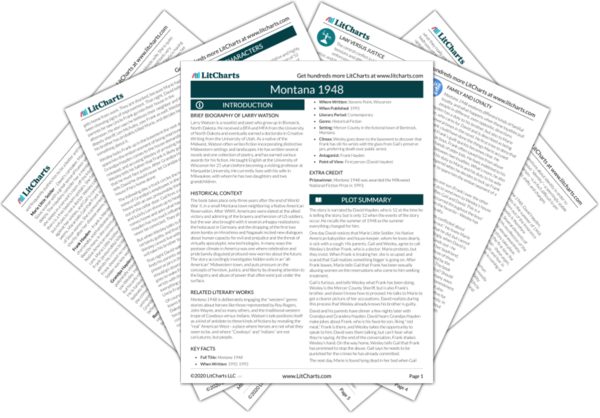Law versus Justice
The central conflict in Montana 1948 concerns the tensions and differences between the practice and enforcement of law and the more abstract notion of justice, and the realization that the law does not or cannot always provide justice. The book repeatedly notes how the practice and enforcement of law is susceptible to public opinion and abuses of power.
Dr. Frank Hayden takes advantage of the fact that the his brother, Sheriff Wesley Hayden, does…
read analysis of Law versus JusticeFamily and Loyalty
Montana 1948 explores different kinds of familial loyalty, and what happens when these loyalties pull people in different, even opposite, directions. Wesley Hayden has a duty to his brother, but also to Marie Little Soldier, who cares for David and is described as being “like family” several times in the novel. He first tries to deny that his brother Frank could have done the things Marie accused him of doing, but Frank’s guilt quickly…
read analysis of Family and LoyaltyRacism, Prejudice, and the American West
Montana 1948 is a historical fiction about life in the “American West” shortly after the Second World War—it serves as an account of how racism affected individual lives in the specific time and place indicated by the book’s title. Bias against Native Americans in the Hayden’s community is fundamentally unquestioned. David, who narrates the story as he looks back from adulthood, comments that as a child, he never questioned certain biases, but now he…
read analysis of Racism, Prejudice, and the American West
Identity
The novel often asks its reader to consider what determines a person’s identity. Is someone defined by their profession? Their familial position? Their successes or mistakes? Their race or culture? Or is there such a thing as “true” identity, some identity that exists independently of all of these things? Gail maintains that Wesley cannot be his “true” self while working as a sheriff, and wishes he would start practicing law instead. When his family talks…
read analysis of IdentityGrowing Up
The narrator of Montana 1948, David Hayden, often describes the events in the summer of 1948 as events that wrenched him out of the innocence and obliviousness of childhood. The novella is therefore wrapped up in a coming of age narrative. Several elements of his coming of age are present throughout his recollection of the story. The first of these is David’s increasing sexual awareness. David is 12 years old when the events…
read analysis of Growing Up











